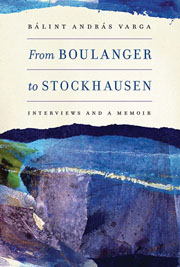Book contents
- Frontmatter
- Dedication
- Contents
- Foreword
- Acknowledgments
- Part One Interviews
- Preface to the Interviews
- Composers
- Georges Auric
- Alois Hába
- György Kurtág
- György Ligeti
- Karlheinz Stockhausen
- Conductors
- Instrumentalists
- Singers and a Record Producer
- A Teacher
- Music Administrators
- Snippets
- Part Two A Memoir
- Notes in Retrospect
- Index
- Miscellaneous Endmatter
Alois Hába
from Composers
Published online by Cambridge University Press: 05 January 2014
- Frontmatter
- Dedication
- Contents
- Foreword
- Acknowledgments
- Part One Interviews
- Preface to the Interviews
- Composers
- Georges Auric
- Alois Hába
- György Kurtág
- György Ligeti
- Karlheinz Stockhausen
- Conductors
- Instrumentalists
- Singers and a Record Producer
- A Teacher
- Music Administrators
- Snippets
- Part Two A Memoir
- Notes in Retrospect
- Index
- Miscellaneous Endmatter
Summary
As I look back, Alois Hába's figure emerges through the mist of time, as he entered the room in Prague where I was waiting for him. He was seventy-nine but looked older. A pale, gray figure in a shabby coat, with a kindly, friendly, and shrewd look in his eyes. He rather looked like a village schoolmaster, which, as it turned out, he had been in his youth.
Our interview had an ABA form: it began as a tale, turned into an impassioned tirade with his fist landing on the table to add emphasis to the point he was anxious to bring home to me and ended, with an unexpected and abrupt change of voice, as peacefully as it had begun.
A few years later, I told Pierre Boulez of Hába's critical remarks. He said Hába was wrong because it is not the intervals you use that make your music “modern” but rather your thinking. Hába's music (Boulez continued) was just as rooted in tradition as Ivan Wyschnegradsky's, another pioneer of microtonal music.
O
Alois Hába: I attended teachers' training college; that's where I obtained my degree. Thanks to my music teacher who had studied with Vitězslav Novák, I had the privilege of receiving a high-level education in music theory.
I found employment as a teacher for two years in Eastern Moravia, which brought me in touch with Moravian and Slovak folk music.
- Type
- Chapter
- Information
- From Boulanger to StockhausenInterviews and a Memoir, pp. 14 - 18Publisher: Boydell & BrewerPrint publication year: 2013



